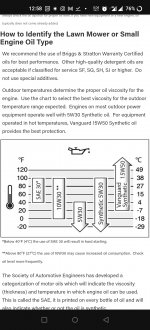What was being originally said is the best oil is what the item was designed to run on and not some new beaut formulation because it says so on the bottle.
Some times using a higher grade of oil will be beneficial, some times it will make no difference whatsoever and some times it will be detrimental .
Fluids, all fluids be they water oil or even honey follow the rules of fluid dynamics with relation to flow
and all fluids have a resistance to flow
The simple example we are all familiar with is water through a hose and the pressure loss over distance.
Run a a hose , no nozel on the end for a few minutes and see how far the water goes strait up
Then hook 2 together and do the same , then 3 if you have one and even four
The longer the hose the lower the flow rate despite the original pressure ( call it an oil pump ) remains the same and around here it is 80 psi
The lower rate of discharge is because of the internal friction of the water molecules caused by the ones nearest the wall of the hose suffering turbulant flow .
If the internal friction is lower this effect is less pronounced so more water will flow through the same space per unit of time .
And this effect is the same for any fluid from water through to bitumen and also powders if they are ground fine enough like flour or cement.
Because the molecule sizes in synthetic or even semi synthetics is both smaller and more consistant then they flow faster under pressure in confined spaces and in particular when being pressurised or forced through a constricted space
Inside your hydro the only reason it moves is because the resistance of the oil to flowing between the rotating cylinder block and the stationary kidney plate is higher than the resistance from the piston pushing the swash plate.
So when designed to run on synthetics the space between these two surfaces must be either closer or rougher.
And there is no seal between the pistons and the cylinders they run in either so again the resistance of the oil to flow around the side of the piston is all that is making a seal and preventing all of the oil flowing around the piston rather than make the piston move.
Most of the heat heat energy that is converted from the mechanical energy is derrived from this internal resistance to flow
I hope this is clearer than the previous that was written off the top of ones head
What is written on the web should always be taken at face value because I could be a retired 70 year old graduate with multiple degrees & diplomas who worked all his life in the oil industry ( and I am not ) or a 10 year old with advanced internet search skills who gets their jollies by pretending to be the above and fooling people or any where in between .
So Rocket is more than welcome to cross post everything written in order to validate what was posted with other electrons in cyber space that he believes in .
The fact that he felt compelled to cross post tells me either I failed to properly express myself (and yes it could have been better ) or he does not have sufficient understanding to evaluate it himself so sought the council of others whom he has faith in
Knowledge is some thing that is acquired over time and never from a single identifiable source and relying on any single source that can not be verrified as a primary source is always fraught with dangers as every step away from the primary source you get the facts get closer to opinion.
But to verrify you need to understand the basic principles be that mathematically or practically and with oils it is all about the molecules , the size shape distribution and valencies and the way they interact with each other & the materials they come in contact with




